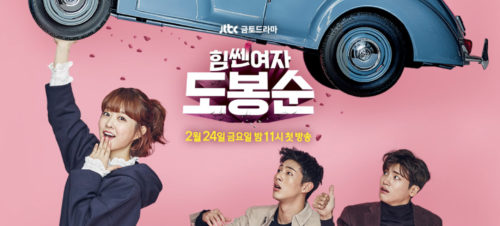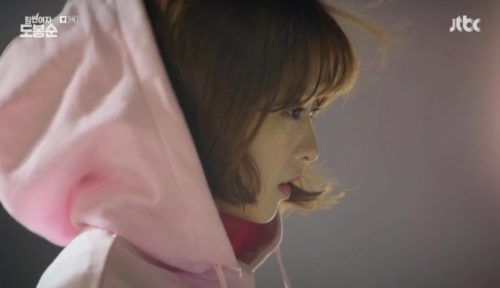K-drama review: Strong Woman Do Bong Soon

I am very torn in my reactions to this K-drama. On the one hand, I love the lead character and the setting felt more like a realistic modern Seoul than any of the other dramas I’ve seen set there, except maybe Doctors (Strong Woman Do Bong Soon first aired in Korea in 2017 so it is the newest K-drama I have watched). On the other hand, the sense of humour can be not only juvenile, but also homophobic.
And it started so well! This show juggles a few different genres and to begin with I loved the switches from one to another, but they were less well balanced in the second half. Similarly, the storylines all started strongly, but got a bit lost around the halfway point. It’s almost as though different writers took it over. It’s certainly the first time with one of these K-dramas where it hasn’t felt carefully plotted from start to finish.
Genre one is superhero, and the superhero in question is Do Bong-soon (played by Park Bo-young). She is a petite 27-year-old who didn’t do well enough at school to go to university, has never held one job for long, but dreams of designing computer games. Oh, and she has supernatural strength, which she uses to save people from danger. She’s cute and girly but also a little bolshy, which probably comes from her experience of standing up to bullies.
The series opens with a fantastic sequence of Bong-soon throwing grown men across a construction site in retaliation for their mistreatment of a school bus driver. She is spotted by handsome young games company CEO Ain Min-hyuk (Park Hyung-sik), who promptly recruits her as his bodyguard. They come to the agreement that if she successfully catches the stalker who has been threatening him, she will be transferred to the strategy department of his company, where she can design games.
The superhero theme and computer games obviously go together well, and the show is packed with the kinds of comical noise and visual effects that you might find in a cartoon. The two Parks play up the cartoonishness with plenty of exaggerated facial expressions, particularly in their scenes together.

Genre two is crime thriller. In the neighbourhood where Bong-soon and her family live, women are being kidnapped by a criminal who is at first kept anonymous by the show. There is a scary dungeon and physical violence and a super creepy featureless rubber mask. We follow the kidnapper and the police investigation separately and to begin with this is handled really well.
One of the local detectives on the case is In Guk-doo (Ji Soo), an old school friend of Bong-soon. She has had a crush on him since school, but he treats her like an annoying little sister (despite being the same age). He is one of the few people in Bong-soon’s life who doesn’t know about her superpower.
Genre three, of course, is romance. I actually quite liked that this didn’t really get going until the second half of the season, and that for a long time the inevitable love triangle didn’t make it completely obvious who Bong-soon would end up with. It also bucked a few other trends. For instance, at one point an arranged marriage is suggested and immediately batted away, never to raise its head again. Once they get together, the lead couple are really very sweet, and their romance feels a little more modern than in other K-dramas. But the romance completely overwhelms the superhero and crime storylines, leaving them underserved (and pretty poorly written) in the second half.
However, my main complaint is definitely the homophobia. Early on, the show suggests that Ain Min-hyuk might be gay and at first I thought this was the most progressive discussion of sexuality I had seen in a K-drama. But it gradually becomes clear that this is the first of several “jokes” where being gay is the punchline. There is a gay character in the second half of the show who is so offensively depicted that I very nearly stopped watching altogether.
The sense of humour does veer to other places I don’t find funny: lots of toilet humour, quite a lot of goons getting hurt by clumsiness or stupidity. And there appears to be a running gag about whether Bong-soon’s mother is physically abusing her husband, which I fail to see anyone having a laugh at. A lot of this not-humour was based around groups of secondary characters who could easily have been cut altogether, such as Bong-soon’s mother and her friends who meet to gossip and complain about their husbands, or the mafia gang that Bong-soon beats in the first episode and spend most of the series in hospital as a result. And there are so many storylines that fizzle out, some of which could have been much more interesting to stick with than their replacements. I would much rather have had more of the Ain family and their machinations, rather than the mafia boss getting conned by a fake Indian guru.
It really was a series of two halves. Bong-soon is for the most part an awesome heroine, imperfect but well intentioned, strong physically and emotionally. But on reflection this series has so much wrong with it (the way Ain Min-hyuk abuses his power over Bong-soon is genuinely icky). The acting is solid, but there are no standouts. The two Parks are a little hammy, though also adorable much of the time, while Ji Soo is super serious.
One last note: on Netflix this series is called Strong Girl Bong Soon, which annoys me because everywhere else I’ve seen it uses the word “woman”. And the subtitles on Netflix have over-Westernised the dialogue, for instance switching the order of names to Western style Firstname Lastname, which is very confusing when you can hear the actors saying it the other way round. Unlike in Boys Over Flowers, which taught me a lot about Korean honorifics and forms of address, these subtitles just used first names or, for example, “Mr Ain”. Which is a particularly odd decision when there are many scenes in which the way characters are addressed is a key plot point. It’s very strange to have two characters argue about whether they should be using the polite form of address or the familiar when according to the subtitles they’ve been using the same wording.